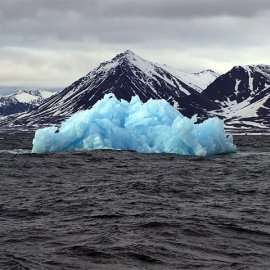Arctic Futures, Part One (Governance, Oversight, and Natura Resources)
-
English
-
ListenPause
Welcome to World Ocean Radio… I’m Peter Neill, Director of the World Ocean Observatory. Because the ocean is so wide, deep, and dynamic, sometimes it is best to look inside the larger perspective and examine the conditions and challenges of one area that might stand for all. One regions that serves, of course, is the Arctic, the full circumpolar Arctic Ocean with all the diverse conditions, resources, and needs that are both specific and generally representative of the many issues faced elsewhere. First, there is the problem of governance. The Arctic region is divided among eight nations with national claims and jurisdictions that often conflict, overlap, and confuse. Efforts have been made to coordinate and resolve interests through a multi-national process in the form of the Arctic Council, a concurrence of nation states with direct claim on Arctic territory augmented by observer nations with self-proclaimed interests. So while China and Brazil have no geographic relationship to the Arctic interest, they do lay claim to a second tier of engagement. A third tier comprising other political entities: UN agencies, non-governmental organizations, educational and research institutions, environmental groups, for-profit associations, and interested individuals convenes separately as the Arctic Circle to present and debate, support and challenge the more formal machinations of the Council. It is a lively conversation. The Council leadership passes from one member state to another every two years; the United States held the chair from 2015 to 2017 when it passed the responsibility to Finland. The stated goals are lofty. The US priorities were Arctic Ocean Safety, Security, and Stewardship; Improving Arctic Economic and Living Conditions; and Addressing the Impacts of Climate Change. Truth, of course, is in the details, more specifically in the research goals, actual implementation, and financial commitments. The US expressed ambitious intent, but as with so many issues these were impeded by climate politics, budget cuts, and indifference to a problem and place out of mind; as a result, its successes were limited. Much was to be invested in observation and research to confront identified problems of acidification, black carbon, biodiversity, meteorological forecasting, the melting of sea ice, long-term observations, health problems, air quality, water and sanitation, renewable energy, transportation, ship safety and operations, renewable energy, communications, and social matters, such as secondary education, high unemployment, domestic violence and suicide rates. If there was progress, it was incremental. The total population of the Arctic region is estimated at 5 million persons, about 500,000 are indigenous peoples living in remote places, sustaining their lives through traditional practice, keeping their languages and cultural traditions, and very specifically, surviving at the very end of the governance, policy, and financial pipeline. During the two years of the US chairmanship, two critical, inter-related global problems were up for debate: the demand for fossil fuels and the negative consequences of that demand as expressed in changing climate. The US was consumed by the political reality of that situation, embodied in an election, and while government attempted to move forward, signing the Paris Climate Agreement and implementing environmental regulation by Executive Order, the underlying premises and demands of the energy sector presented an insidious political counterforce against any real advancement. This condition remains, even aggravated by the declared policies of the new US Administration. Interest and funding would seem to be little or nothing. No new official Arctic envoy and participant in the Arctic Council has been nominated, and may not be, as a complete abandonment of official American engagement in the region. But the issue will not go away, in the Arctic or in the many other places on earth where these same problems exist and must be addressed. If we are indifferent to the Arctic, we are indifferent to all of them, even to the ones in our own back yard. We will discuss these issues, and more, in future editions of World Ocean Radio. WORLD OCEAN RADIO IS PRODUCED IN ASSOCIATION WITH WERU-FM, BLUE HILL, MAINE. FIND OUR PODCAST ON ITUNES AND AT WORLD OCEAN OBSERVATORY DOT ORG.
This week on World Ocean Radio: part one of a multi-part series on the Arctic. In this episode, host Peter Neill examines governance, oversight, resources, and the conditions and challenges facing the Arctic. He describes the work of the Arctic Council, an eight-nation consortium with jurisdiction in the region, and outlines the processes and responsibilities of stewardship by those member nations.
About World Ocean Radio
Peter Neill, Director of the World Ocean Observatory and host of World Ocean Radio, provides coverage of a broad spectrum of ocean issues from science and education to advocacy and exemplary projects. World Ocean Radio, a project of the World Ocean Observatory, is a weekly series of five-minute audio essays available for syndicated use at no cost by college and community radio stations worldwide.
Image
Glacial Ice growler. New Alesund, Svalbard, Norway
Credit
Thomas Hallermann/Marine Photobank
- Login to post comments



